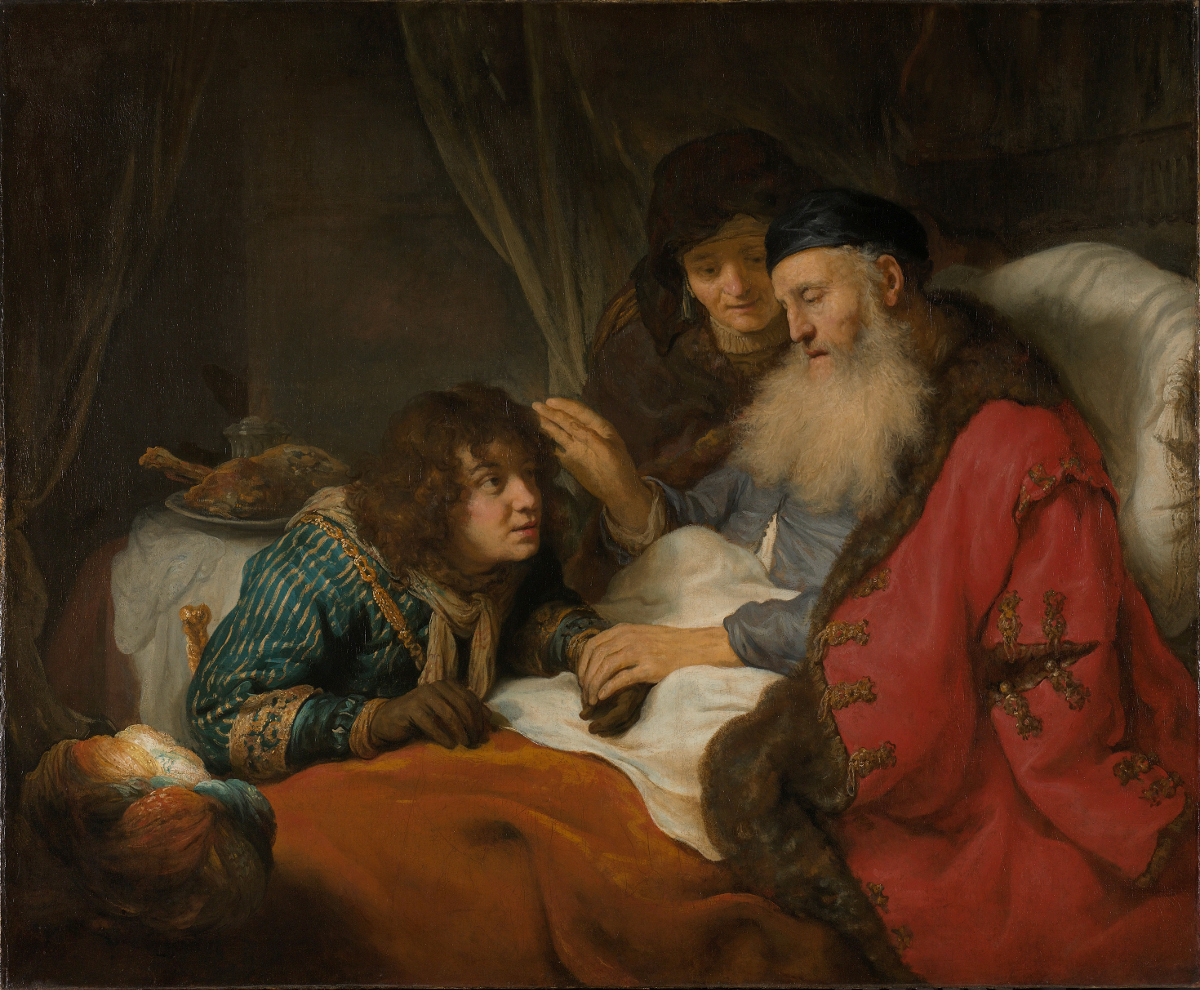 |
| "Isaac Blesses Jacob" by Govert Flinck (1615-1660). |
Isaac was old and practically
blind. He felt the end was coming, so
he called his boy Esau in and told him to go out hunting wild game for
him. “Kill me something that tastes
good and I’ll do something really nice for you before I die. Which is soon.” So Esau took off for the countryside to go kill an animal.
Rebekah heard this and approached
her boy Jacob. She told him she’d like
him to bring her a couple of kids so she could make something she knows Isaac
will like, rather than take their chances on whatever animal Esau happens to
catch. (Oh, and kids means baby
goats, just to be clear. Isaac hasn’t
converted to Baalism or anything like that.
Kosher laws do not exist yet, but cannibalism is still frowned upon.) Jacob wasn’t sure about this plan. “Dad expects Esau to do this, not me,” he
told his mother. “He can barely see
anymore, so we might be able to pull this over on him. But what if he touches me? Then he’ll know I’m not that hairball
wilderness-dweller of a brother of mine, but rather the clean-shaven,
upwardly-mobile one. Dad isn’t going to
like that.”
“Oh, don’t let that old man get
to you. If there’s a problem, it’s on
me. Now go get those kids. While I’m cooking, you can get dressed in
your brother’s clothes, so your dad won’t be able to tell it’s you. We’ll use them to cover up that smooth skin
of yours.”
“But if he’s blind, how would he
know? I mean, couldn’t I just wear my
clothes, and—“
“Enough! Just do it already! You worry too much! Your father’s soft enough in the head that
we could tell him you’re King Nimrod and he’d believe it.”
At dinnertime, Jacob got ready to
bring the meal to his father. To make
extra sure, his mother took the hides of the dead kids and draped them around
his neck and over his arms. “Dad,” said
Jacob, “I’m Esau, your first born, remember?
I did what I asked you to.
Here’s the meat, cooked to perfection.”
“That was quick,” said old
Isaac. “How’d you manage to get an
animal that fast?”
“Because God helped,” Jacob told
him. “That’s how.”
“Can’t argue with that logic,”
replied Isaac. “Now come on over
here. I want to make sure you’re
actually Esau.”
“Don’t you trust me?” asked
Jacob.
“Uh… sure. Now get over here.” Isaac felt funny about this. This person had Jacob’s voice, but was hairy
like Esau. Or like a young goat. One of those. “You’re really Esau, now?”
“I am,” said Jacob, who was
already in this too deep to back out.
“Okay. Now serve me this game you caught (whatever this animal is) so I
can give you my blessing.” Jacob did,
and Isaac ate and drank. “Come even
closer now, and kiss me, my son.” As
Jacob kissed him, Isaac could smell his clothes, which convinced him that this
was indeed his son. Then he blessed
Jacob-cum-Esau like this:
“Ah, that’s my son!
He smells like the goat
Wrapped ‘round his throat!
May God give you
Lots of great stuff
And it never comes tough
And He gives you enough!
I hope everyone does
What you want, because
You’re the master of your
brothers,
Of all women’s boys, including
your mother’s.
If anyone curses you, if they
try,
I hope God pokes them in the
eye!”
“That was beautiful, Dad,” said
Jacob.
“Thank you, Esau, my eldest
son. I meant every word of it.”
Satisfied that the con worked so
well, Jacob left. Not long after that,
the real Esau showed up, announcing, “Dad!
I killed some kind of animal, and I cooked it! It’s really good! You
hungry? Can you give me one of your
special blessings, with the rhyming couplets and everything?”
“Who are you?” asked Isaac.
“I’m Esau,” said Esau. “Your first born. First. Because the first
son is the most important one. Remember
that.”
Isaac was so mad he started
shaking. “So who was it that went
hunting and brought me that other animal that I ate just a little bit ago? Because I gave him a blessing, and that blessing’s gonna stick! No backsies!”
Esau was pissed. “Dad, bless me, too! I mean, I did what you asked, right?”
“No. I see it now. Jacob dressed
up as you and took your blessing. I
can’t write another one now. Those
things take time to come up with, you know.”
“What’s with this guy? First he takes my birthright, then he takes
my blessing. Granted, I didn’t really
want the birthright, ‘cause I play by my own rules and stuff, but blessings are
different. I can always use one of
those.” Then Esau turned to his father
and asked, “Are you sure you don’t have another blessing for me?”
“Jacob already has all the stuff
that the eldest child usually gets, Esau,” said Isaac. “Sorry about that. What can I do for you, at this point?”
“A blessing!” said Esau. “Weren’t you listening? I just want a blessing! They’re free! Can’t you just come up with something? I don’t even care if it rhymes, at this point!” Esau started to cry as his father sat there
listening, stone-faced.
Isaac then said:
“Do as you should:
Go out in the wood,
You’ll find stuff that’s good.
Live by your sword,
Jacob got my whole hoard,
It’s your brother who scored.
See? You’re basically Jacob’s slave now. When you win your freedom, you won’t have to answer to him
anymore.”
“Some blessing, Dad. Thanks a lot.”
Because he was so used to
wandering around in the woods by himself, Esau said aloud, “Dad’s gonna die
soon. When he kicks, I’m gonna kill
Jacob and then I’ll get everything.”
Rebekah heard all this, and ran
to Jacob to warn him. “Your brother
wants to murder you,” she said, “but he’ll get over it, I’m sure. But for now, go to Haran, where your Uncle
Laban lives. He’ll take you in while
this blows over. I’ll let you know when
it’s okay to come back.”
After Jacob left, Rebekah said to
Isaac, “I sent Jacob to live with my brother in Haran for a while. I hope he doesn’t take up with one of those
Hittite women. They’re gross. If he marries one of them, then what? My other son will be running around in the
woods, and you’ll be dead. What’ll
there be for me? Oh, I hate those
Hittites.”
“I love and respect you, my
wife,” said Isaac. “I’ll make sure our
son carries on your brand of racism”


Comments